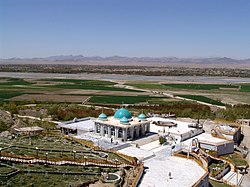Arghandab District, Kandahar
This article needs additional citations for verification. (May 2008) |
Arghandab District
ارغنداب | |
|---|---|
 The Shrine of Baba Wali in the Arghandab district. | |
| Coordinates: 31°39′17″N 65°38′58″E / 31.65472°N 65.64944°E | |
| Country | |
| Province | Kandahar Province |
| Center | Town of Arghandab |
| Elevation | 1,112 m (3,648 ft) |
| Population (2006) | |
• Total | 54,900 |
| Time zone | + 4.30 |
| Website | Arghandab.gov |
Arghandab (Pashto/Persian: ارغنداب) is a district in the central part of Kandahar Province, Afghanistan.[1] It borders Panjwai and Khakrez districts to the west, Shah Wali Kot District to the north and east and Kandahar District to the east and south.[2]
The population, as of 2006, was 54,900. The district centre is Arghandab, located northwest of Kandahar. The Arghandab River flows through the district in its eastern part West from the district center, and the area is irrigated by the Helmand and Arghandab Valley Authority.[3][4] The climate, river and irrigation allow the inhabitants to aggregate several different forms of produce. The main agricultural crops in this region are pomegranates, grapes, plums, and Cannabis sativa.

History
[edit]Arghandab was known as "the gateway to Kandahar." Through the ridges that overlook Kandahar City to the north, the valley was the only viable northern route for commerce or invaders. If Arghandab was held, an invader could not enter the city from the north. In 2007, the Alkozay tribe ruled Arghandab, led by the mujahideen commander, Mullah Naqib. He and his Alkozay had safeguarded the city since 2001. The Arghandab Alkozay had a certain esprit de corps. They were proud of their green district and its pomegranates and grapes. They were even prouder of their warrior history and Mullah Naqib. They saw themselves as one group. If asked his home, a young tribesman would shout back, "Arghandab!" That pride was a powerful check on a Taliban advance on Kandahar-whether in 1994 or 2007.[5]
War in Afghanistan
[edit]The district was the site of the Battle of Arghandab in June 2008.
On 16 November 2009, Taliban attackers raided a police station, killing eight officers and wounding three. Three other police officers in the station disappeared, and a spokesman for the Kandahar governor's office, who asked not to be identified by name, said he was not sure if the officers who disappeared had a connection to the Taliban.[6]
On 9 June 2010, a suicide attack at a wedding party in the village of Nagahan of the Arghandab district killed at least 40 people and wounded 77, making it one of the worst attacks of the year.
From November 2020, there have been multiple attempted takeovers of the district by Taliban. As of December 9, 2020, the district remains to be contested, with the Taliban believed to be occupying the area along the western bank and Afghan security forces believed to be occupying the eastern bank (including the Baba Wali Shrine).[7]
On December 24, 2020, Afghan forces recaptured the entirety of the district, killing 37 insurgents in the process.[8]
Notables
[edit]- Mullah Naqib
- Shahwali Khan
- Tayyab Agha
- Syed Muhammad Akbar Agha
- Niamatullah Arghandabi
See also
[edit]References
[edit]- ^ Johnson, Thomas H.; Adamec, Ludwig W. (2021-05-15). Historical Dictionary of Afghanistan. Rowman & Littlefield. ISBN 978-1-5381-4929-4.
- ^ Trousdale, William B. (2021-03-08). Kandahar in the Nineteenth Century. BRILL. ISBN 978-90-04-44522-2.
- ^ (pdf) The Helmand Valley Project in Afghanistan: A.I.D. Evaluation Special Study No. 18 C Clapp-Wicek & E Baldwin, U.S. Agency for International Development, published December 1983
- ^ Zentner, Matthew (2011-10-13). Design and impact of water treaties: Managing climate change. Springer Science & Business Media. ISBN 978-3-642-23743-0.
- ^ Malkasian, Carter (2021). The American War in Afghanistan: A History. Oxford University Press. ISBN 978-0-19-755077-9.
- ^ Rubin, Alissa J. "Taliban Militans Fire Rockets on Crowded Bazaar Northeast of Kabul. http://www.afghanemb-canada.net/en/news_bulletin/2009/Nov/17/index.php[permanent dead link]
- ^ "Joy Lahore base in Arghandab district abandoned. Taliban entered this morning after it got besieged yesterday Kandahar, Kandahar". Afghanistan news map - security alerts from Afghanistan - afghanistan.liveuamap.com. Retrieved 2020-12-09.
- ^ minawi, khalil [@khminawi] (December 24, 2020). "At least 37 Taliban rebels have been killed during air and ground operations conducted in Dand, Arghandab, Maiwand, and Shah Wali Kot districts of Kandahar province over the past 24 hours, Kandahar provincial police and NDS claimed" (Tweet). Retrieved 29 December 2020 – via Twitter.


